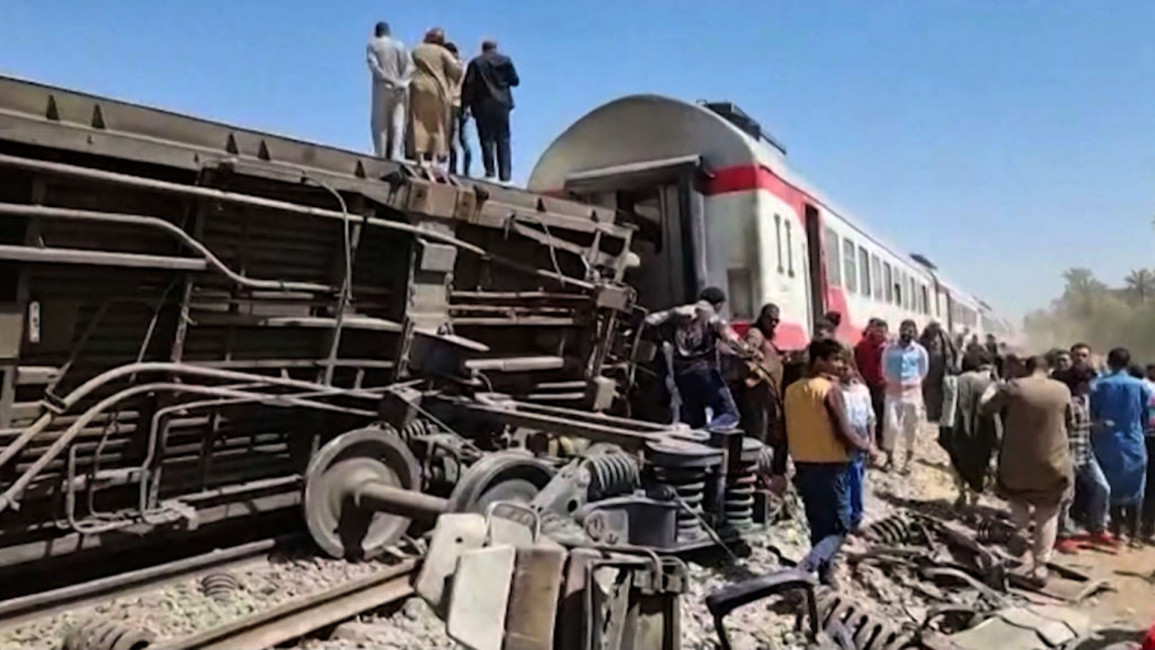Egypt passenger trains collide killing 32
At least 32 people were killed and 66 injured Friday when two passenger trains collided in southern Egypt, the health ministry said, the latest deadly rail accident to hit the country.
President Abdel Fattah al-Sisi pledged tough punishment for those responsible for the crash, which came as his government wrestles with another major transport challenge, a giant container ship blocking the Suez Canal and causing huge traffic jams at either end.
The health ministry said dozens of ambulances rushed to the scene in the Tahta district of Sohag province, some 460 kilometres (285 miles) south of the capital Cairo after the two trains collided.
"32 people were killed and 66 injured" and transported to hospital, the statement said.
Dozens of people gathered around an overturned carriage lying on its side. Springs and twisted metal jutted out from the wreckage of another, an AFP correspondent reported.
Egypt's rail authority said that unidentified passengers had "activated emergency brakes in several carriages" causing the collision.
At least two carriages overturned between the stations of Maragha and Tahta, it said in a statement.
One train was travelling between the southern city of Luxor and Alexandria on the Mediterranean coast while the other was travelling between Cairo and the southern city of Aswan.
Health Minister Hala Zayed travelled to Sohag to check on the injured, as authorities opened an investigation into the circumstances of the accident.
Twitter Post
|
President Sisi vowed "deterrent punishment" for anyone found responsible for the collision.
"Anyone who caused this painful accident through negligence or corruption, or anything similar, must receive a deterrent punishment without exception or delay," he said in a tweet.
Egypt has been plagued with deadly train accidents in recent years that have been widely blamed on inadequate infrastructure and poor maintenance.
One of the deadliest occurred in 2002 when 373 people died as a fire ripped through a crowded train south of Cairo, and there have been many fatal crashes since.
Train crashes, Suez shutdown
In March last year, at least 13 people were injured when two passenger trains collided in Cairo, triggering a brief suspension of rail services nationwide.
At the time rail managers blamed the crash on signals not functioning in bad weather.
And in February 2019, a train derailed and caught fire at Cairo's main railway station, killing at least 22 people and injuring 41, and prompting the transport minister, Hisham Arafat, to resign.
The following month, the president appointed a senior military officer, General Kamel al-Wazir, to head the transport ministry.
Wazir had been the head of the Egyptian military's engineering authority since 2015.
The unit is behind many of the army's mega-projects. including a new capital east of Cairo and construction of everything from hospitals to sewage treatment plants.
Since he took office in 2014, Sisi has appointed military officers to high-ranking positions, including governorships.
He has repeatedly praised the military's role in delivering major projects in record time such as the expansion of the Suez Canal in August 2015.
The strategic waterway has made headlines since Tuesday, when the container ship MV Ever Given - which is longer than four football fields - got stuck across the entire canal shutting the vital shipping lane in both directions.
The blockage has caused huge traffic jams at either end of the 193-kilometre (120-mile) long canal and major delays in the delivery of oil and other products.
Tugboats and dredgers were working Friday to free the vessel as companies were forced to re-route services from the Suez Canal around the southern tip of Africa.
Egypt's Suez Canal Authority said the vessel veered off course and ran aground when winds reaching 40 knots whipped up a sandstorm that affected visibility.



